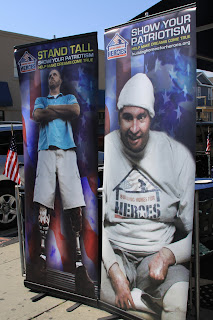In 2007, while on a mission to rescue Marines who were under attack, Army SSG Castillo’s vehicle was struck by an IED. Despite head trauma and numbing throughout his body, he courageously continued to fight. While under heavy enemy fire, he fought his way back to the vehicle in an attempt to save fellow soldiers.
During the battle, SSG Castillo was shot five times; twice in the chest, once on the top of his head and once in the right leg. Still struggling to get back to the Humvee, he was struck again. This round struck him under the chin and exited out his mouth. As he reached the driver of the burning vehicle, an RPG struck the Humvee and severed his left leg above the knee. William was the only survivor.
For his courage and bravery, he was awarded The Purple Heart. Castillo has dedicated himself to help other wounded soldiers. William and his wife Katherine have four children. The Castillo family will be the recipient of a home provided by Building Homes for Heroes.
Orlando, Florida – Ocoee and Orange County firefighters join Building Homes for Heroes to build a home for a wounded veteran
Nearly 200 volunteers came out on Saturday March 6th to take part in the kickoff of a complete home makeover for wounded Iraq War veteran Army Staff Sergeant William Castillo on Enclave Drive in Orlando, Florida. The groundbreaking ceremonies followed a ceremonial parade of fire trucks and fire fighters; police vehicles and officers, guest of honor Army Spc. Robert "B.J." Jackson of Des Moines, Iowa, and community supporters.
Called upon to save wounded Marines, Staff Sergeant Castillo, who is a Purple Heart recipient, withstood five bullet wounds – including one that struck his head and one that exited through his mouth – after an IED exploded under his Humvee in Iraq. Still struggling to get back to the burning truck to help members of his unit, a missile cut through the vehicle – and severed his left leg. He was the lone survivor of the attack. While helping others, he survived two explosions and five bullet wounds. Now, the Orange County community is here to help him and his family. William and his wife Katherine have four children.
Taking part in the ceremony were firefighters from the Orange County and Ocoee fire departments, led by IAFF Local 2057 president George Romano, and IAFF Local 3623 president James Kelley. Also in attendance were local merchants, volunteer tradesman, corporate sponsors, and volunteers and onlookers from the Ocoee community. After the ceremonies and the commencement of the demolition of the home, there was a barbecue for the neighborhood, and all others involved, courtesy of Local 2057.
Among the major sponsors in attendance was The Just in Queso Foundation, the non-profit arm of Tijuana Flats. Just in Queso presented a check for over $46,000 to support the effort to convert the house into the Castillo family home. The renovation is expected to take six weeks.
































